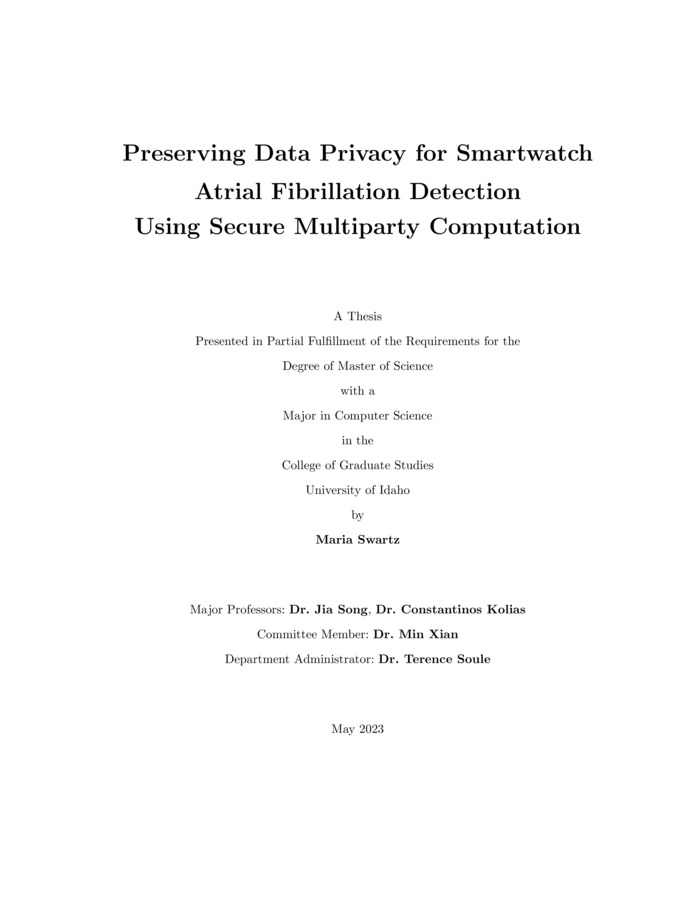Preserving Data Privacy for Smartwatch Atrial Fibrillation Detection Using Secure Multiparty Computation
Swartz, Maria. (2023-05). Preserving Data Privacy for Smartwatch Atrial Fibrillation Detection Using Secure Multiparty Computation. Theses and Dissertations Collection, University of Idaho Library Digital Collections. https://www.lib.uidaho.edu/digital/etd/items/swartz_idaho_0089n_12618.html
- Title:
- Preserving Data Privacy for Smartwatch Atrial Fibrillation Detection Using Secure Multiparty Computation
- Author:
- Swartz, Maria
- ORCID:
- 0009-0007-8608-6747
- Date:
- 2023-05
- Keywords:
- Atrial Fibrillation Data Privacy IoT Machine Learning Secure Multiparty Computation Smartwatches
- Program:
- Computer Science
- Subject Category:
- Computer science
- Abstract:
-
During the past few years, the introduction of a new communication paradigm known as the Internet of Things (IoT) has revolutionized sectors such as manufacturing, transportation, and retail. Inevitably, healthcare has been deeply impacted by the proliferation of these smart devices. More specifically, IoT has been applied to tracking important health parameters, recording vital signs, and finally providing accurate diagnoses regarding some health conditions. For example, smartwatches are capable of identifying early signs of heart conditions such as certain types of arrhythmias, and provide early warnings.Behind the scenes, the diagnosis is done by relying on Artificial Intelligence (AI) and Machine Learning (ML) algorithms that capture heart-related data through the use of a sensor. However, due to the high demands in processing, memory, and energy resources, this processing is rarely conducted locally, at the smartphone level. Typically, the analysis of data using data is done in the cloud through an infrastructure owned by a not-necessarily trusted third party. However, this sharing of sensitive personal health data often raises privacy concerns for consumers. This in turn may act as a roadblock to the adoption of IoT in healthcare. More specifically, two concerns with this approach are that (a) the centralized party may misbehave or become compromised and (b) the data may be compromised by a passive eavesdropper while it is in transit. In our work, we adopted and modified a method that allows the analysis of heart signals in a privacy-preserving manner, namely secure multiparty computation (SMPC). We specifically applied the method to the problem of AF detection. This method allows parties to perform joint computations on protected versions of private data, often referred to as secret shares, without compromising the private data itself. By using SMPC to perform the mathematical operation of addition in a privacy-preserving way, we enabled the lightweight computational nodes i.e., smartwatches to perform the most critical operations that are involved in ML processes without the need for the nodes to know each other’s data. The main contributions of our work are (a) the development of a framework to apply SMPC to the problem of Atrial Fibrillation (AF) detection and (b) the evaluation of the accuracy and network overhead of the secure model compared to traditional machine learning models.
- Description:
- masters, M.S., Computer Science -- University of Idaho - College of Graduate Studies, 2023-05
- Major Professor:
- Song, Jia; Kolias, Konstantinos
- Committee:
- Xian, Min; Soule, Terence
- Defense Date:
- 2023-05
- Identifier:
- Swartz_idaho_0089N_12618
- Type:
- Text
- Format Original:
- Format:
- application/pdf
- Rights:
- In Copyright - Educational Use Permitted. For more information, please contact University of Idaho Library Special Collections and Archives Department at libspec@uidaho.edu.
- Standardized Rights:
- http://rightsstatements.org/vocab/InC-EDU/1.0/

